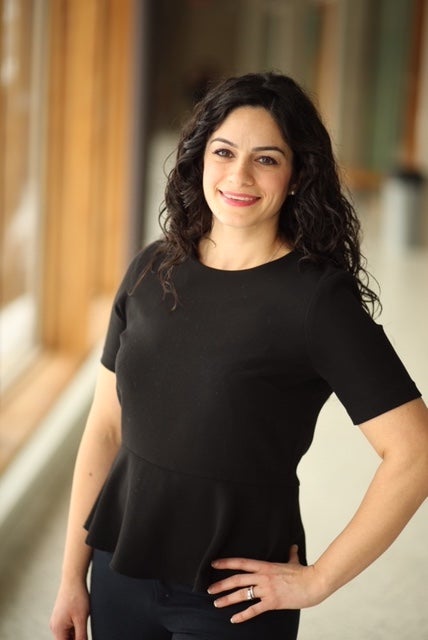Christina Khoury, Rx2018 - Ottawa
Navigating the region
Ottawa is known for numerous and diverse festivals, I recommend attending a show at the Jazz festival… you won’t be disappointed.

Jason Wentzell was our Ottawa Regional Clinical Coordinator (RCC) and he had the dual role as a preceptor at the Ottawa Hospital. Leading up to the move to Ottawa, he reached out to all of us to help with housing and settling into the region. During our first weeks on clinical rotations, a few of us voiced our trepidations in being in clinical roles for the first time. Jason organized a meeting to go over expectations in various clinical settings and different care plans that we would be expected to use on our hospital rotations. These meetings were so helpful and served as my template when I entered my hospital rotations. Take advantage and attend these meetings! Jason is a strong advocate for students practicing to their full scope and he is always ready to pass on his vast knowledge to his students. The clinical rotations he facilitated in the region allowed students to integrate what they learned in the classroom and apply it in a real clinical setting.
For students who want to explore the pharmacy profession (i.e., toxicology, opioids crisis) let Jason know because he will send information for seminars/information sessions taking place in the region.
Practice site descriptions
My last clinical rotation was the medical oncology unit at the Ottawa Hospital (TOH) and it was THE best experience of the pharmacy program. The team at TOH were extremely welcoming, organized, and treated us as colleagues that could contribute new information to the team. Jason Wentzell (Regional Clinical Coordinator) and our designated preceptors invested time in training their students at the beginning of the rotation. The best part of this rotation was that we worked in a team with pharmacy residents, therefore we never felt alone in the learning process. The residents gave presentations on various topics and helped answer any questions we had about our cases/or residency. As a result, we felt comfortable and ready to work independently. Every day would consist of new patient workups or follow-ups, followed by debriefs with our preceptors to discuss our findings/concerns, before executing our care plans.
A few of the roles and responsibilities I had the privilege of practicing were the following:
- Provide direct patient care as part of the interdisciplinary team involved in the care and management of complex patients
- Independently completed and facilitated the ISMP safe practice discharge process and resolved discrepancies with prescribers
- Created patient-friendly discharge medication lists that included the name of each medication, indication, and administration instructions
- Ensured continuity in patient care by connecting with community partners along transition points in patient care
- Provided direct patient care and counselling to patients in the oral anticancer therapy clinic and to in-patients on the medical oncology unit receiving IV anticancer therapy
- Addressed drug therapy problems and clinical questions as they arose in daily practice
- Provided patient-specific pharmacotherapy recommendations and drug information to the medical and nursing staff
- Developed patient-friendly information pamphlets on cancer regimens using language aimed at a Grade 5 level of comprehension
- Helped develop a document for fentanyl patch prescribing that included all requirements in accordance with current legislation for prescribers
I had the opportunity to complete a clinical rotation in the ICU of the Montfort hospital, where I had the unique experience of communicating information in French. The ICU at Montfort is a dynamic and fast paced environment and one of the most challenging rotations I completed.
The staff pharmacist (and student) attends rounds every morning with all health care providers participating in the care of a critically ill patient (dietician, attending nurse, ICU physician, cardiologist, ID, RT, etc.). Students will have the chance of rotating with a few pharmacists in the ICU and all are immensely knowledgeable and helpful. In addition to working with the various preceptors, I interacted with the entire pharmacy team on a daily basis to manage the care of critically ill patients. The team is very welcoming and friendly and were always ready to share their experiences and roles in the various departments in the hospital. My role as a pharmacy student consisted of the following:
- Implementing care plans that were safe, effective and respectful of patient autonomy
- Monitored effectiveness of drug therapy according to patient’s response, lab values, and overall plan to achieve optimal patient outcomes
- Reviewed patient medications upon admission and those that were started in ICU to ensure appropriate dosing for a patient’s specific medical condition
- Collaborated with the interdisciplinary team on rounds in order to make interventions to achieve patient goals
- Collaborated with physicians in regards to dosing for drugs that required therapeutic drug monitoring, renal adjustments, serious drug interactions, or allergy contraindications
- Presented on the 2017 update of the clinical practice guidelines for Clostridium difficile infection in adults from the IDSA and SHEA to staff pharmacists
I am very thankful I had the opportunity to practice at Montfort because it started my transition from a student to an “almost” practicing pharmacist.
The main skills/knowledge I gained from patient care rotations includes:
- Developing short and concise care plans that included all pertinent information
- Prioritizing main issues and executing effective follow up on patients
- Developed communication skills with physicians and other health care professionals
The most valuable experience I gained was CONFIDENCE….
- practicing with other health care providers
- trusting my thought process
- seeking drug information
- learning new disease states on the spot to develop patient-centered care plans
Advice for future students
Each rotation has its own challenge, but when you apply 100% effort you will overcome the challenges and come out a much stronger and confident health care professional. Remember clinical rotations isn’t about practicing comfortably, it is about being challenged and becoming the best pharmacist and interdisciplinary member that you can be. Bon courage!